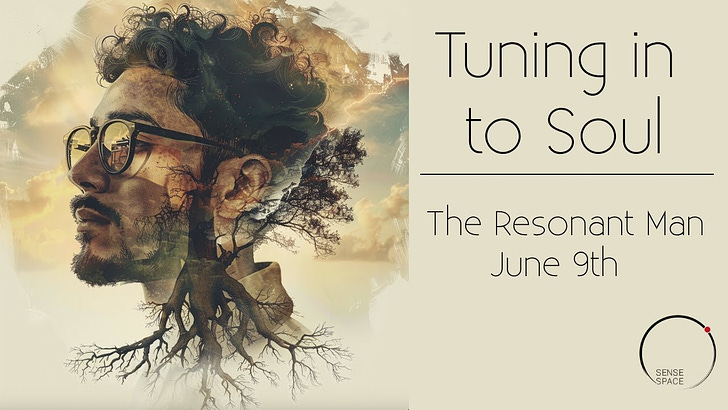There are still some places left in the Resonant Man men’s group that Jacob Kishere and I are launching on June 9; more details here.
And here’s a clip from our dialogue with Cadell Last, founder of the Philosophy Portal, where Jacob talks about the practice of tuning into Soul:
Resonant World #88
The below is transcript of an audio recording I made yesterday evening, a week after the MediaStrong symposium at City, University of London. (To listen to the 13-minute audio version, please scroll up and play the file embedded at the top of this page).
I felt an impulse to make the recording after speaking with Chris Booth, a former BBC journalist who was among the organisers, and who spoke powerfully about his experiences covering the war in Chechnya. You can read his speech in his newsletter here:
Whenever such powerful material is shared, it can take time for those who spoke — and those who listened — to fully integrate the depth of what transpired.
This is my spontaneous attempt to support of that process, offered to all those who took part in MediaStrong, and anyone with an interest in trauma.

Who Bears Witness for the Witnesses ?
Transcript of audio1:
Who bears witness for the witnesses ?
This is the question that’s been coming to me in the week since we closed the MediaStrong symposium on journalism and trauma in London.
It was an incredible occasion where veteran journalists who’ve seen the very best, and the very worst, of humanity in their decades covering wars overseas really bared their souls.
They revealed how these conflicts had lived on in them for decades, and it was clear that for many of them these were not experiences that lived in their past, but were very much a part of their present reality.
And for me, the real power of the event lay in the witnessing of these experiences.
The symposium was held in an amphitheatre-style lecture theater.
It seemed very fitting that as we heard stories of war, of moral injury, of moral dilemmas — themes that would have been familiar from the tragedies of ancient Greece — we were creating a stage.
But more than a stage, a sacred space where it was possible for journalists to speak about things of which they’d never spoken before.
I felt the quality and depth of the listening in the room.
And I hope that for those who were sharing their stories, the quality of that presence provided, or served, at least to a certain extent, as a transformative agent, so that those stories, those parts of themselves that had remained in the dark, could be brought into the light of consciousness.
And I recognize that that might not provide instant relief.
And I also recognize that for those who share, it can be a very disconcerting experience, particularly in the days afterwards, when the mind can come in and start to question whether it was a good idea, whether I said too much, or whether it would have been better to have spared the audience some of the details of the depths of the suffering that these journalists had both witnessed and suffered themselves.
And I think it’s very normal and natural for the mind to pose those questions, because the mind is predicated on maintaining safety, on maintaining the status quo.
And what we did as individuals, and as a collective, last Friday was very far from the status quo.
We invited a quality of awareness, of connection, of presence that we certainly don't establish in the average news meeting, or indeed when journalists gather around the bar.
This was something very different.
I felt there was a real influx of soul.
And what was very clear was that for these journalists, who’d volunteered, or been drawn to pursue huge stories overseas, the hope, or the intention, had been to bear witness to the suffering of others.
And yet it was also very clear that they had become entangled with the conflicts they were covering.
And as they spoke, I had the sensation that we were reaching back through space and time to touch the events they spoke about: the terrible crimes, the losses, the horrors, the moral dilemmas.
And the raw emotion of these moments — the grief, the anger, the shame, in cases, and the fear — was once more alive in that room.
And as we tuned in as a group, as we listened, as we bore witness for the witnesses, I believe that something shifted.
It shifted in those who were watching because we became more intimate with the realities of the wars that these journalists had been covering.
We could be left under no illusions about the cruelty, the depravity, that reigns when all ethical restrictions are swept aside, as they inevitably are for every side in war.
But I also believe that those who were being witnessed received something that may not be necessarily perceptible immediately, but which I hope will provide a kind of soul medicine, a balm, a holding — an awareness that however painful these burdens have been to carry, they are no longer carried alone.
Because the experiences that we can have in war are not experiences that individuals are meant to bear or shoulder alone.
These are aspects of collective trauma fields that are distributed, diffused, across generations, across geographies.
Like tectonic plates, they are of vast, almost unfathomable scale, and immense power, shaping and reshaping our world.
And when we become exposed, when we become caught up in those collective trauma fields, our system will be overwhelmed.
We are not designed to carry those fragments alone.
And yet that is what is expected, particularly of our journalists, who have traditionally not had the kind of spaces to be witnessed in all of the depth of the pain that they’ve absorbed.
Of course, we have our friends, and we have the consolations of the bar, perhaps.
But that’s something different than creating what I would call a sacred space of awareness, to bear witness in the most profound and reverential way.
And I believe that it’s in the witnessing that we recover our own impulse towards ethical restoration.
And I believe that this impulse, this intelligence, operates far beyond our individual sphere, and that what was said, and received by the audience at MediaStrong, will ripple and influence the industry in ways that our linear minds may struggle to perceive, but which I trust profoundly, and anticipate will begin to seed a shift in the way we think about trauma and psychological injury in the media, that will unfold in many and unpredictable ways in the months and years to come.
And I also believe that we sowed some important seeds towards the emergence of what I believe will be a new media system, arriving in our present from the emergent future.
A media system that is rooted in an understanding of the significance of our individual, our collective and intergenerational traumas, and how these are reflected in the chaos and division and unraveling of the world around us.
And this new media system will acknowledge that, yes, we need to take care of our journalists, of course — that by now should almost go without saying.
But it will also acknowledge that the media system is a kind of collective nervous system, that has a role in mediating these collective trauma fields.
The way we produce news, the way we consume news — all of these are channels through which trauma can be amplified, or through which the healing intelligence that animates our individual and collective integration and evolution can be equally nurtured, directed, aligned and received.
I like to think of mycelium networks remediating the soil.
Imagine if our media system could be a mycelium that remediated our societies, our nation states, our global community?
Conveying healing intelligence as much as reflecting and reinforcing fragmentation.
Now, I don’t know what the next steps will be for me personally after MediaStrong, but I already feel new connections forming, new conversations occurring.
And I’d invite anybody who feels touched by this subject to engage in this conversation, to follow the work of the amazing organizers, and to remember that, by bearing witness to the witnesses, we honour the experiences that they documented, the memory of the wars that they were a part of.
But we also extend a deeper level of recognition to the sacrifice that they made, and the price that they have paid, and the complexity that they hold.
Note from the Editor: A labour of love, Resonant World is written in the gaps between work I get paid to do, notably editing investigations at nonprofit climate news service DeSmog. It’s a huge boost when people become paid subscribers, and support of any amount affirms that my mission to support the global community of practitioners engaged in supporting people to integrate individual, inter-generational and collective trauma has value. Thank you!
I made a couple of cosmetic edits to the transcript for clarity.














Share this post